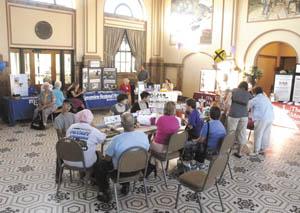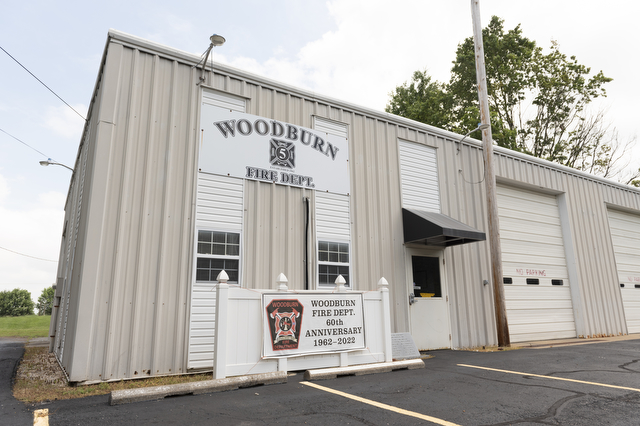Cancer: Encouragement for survivors
Published 12:00 am Friday, June 22, 2007

- Lara Cooper/Daily NewsCancer survivors attend Journey Through Survivorship: A Cancer Survivor Resource Excursion and Celebration on Thursday at the Old L&N Depot.
Community Education enrichment and volunteer coordinator Anne Grubbs remembers doing what she calls “the Taxol shuffle.”
But unlike a dance, it definitely wasn’t fun.
“You can’t walk for five days after you take it,” she said of the chemotherapy drug Taxol, which she took during her battle with breast cancer. “It’s bad but it can always be worse, no matter what it is. I’m blessed to be a survivor.”
Now a four-year survivor, Grubbs spoke to more than 50 people at the Kentucky Center Program and the Barren River District Cancer Council’s “Journey Through Survivorship: A Cancer Survivor Resource Excursion and Celebration” on Thursday at the Old L&N Depot.
Kentucky Cancer Program cancer control specialist Elizabeth Westbrook said the event – which included several booths with information about resources available to cancer patients in southcentral Kentucky – is geared to recognize and honor the survivors.
“This is the perfect venue to learn about resources available to patients. This is not a journey anyone volunteers for or plans to take. There are challenges and issues,” she said. “There are people who don’t have insurance who need help with cancer. There are people who need financial help and help with navigating the system.”
The need for information and support is even more crucial as more people find out they have cancer, Westbrook said.
“There are 10.5 million cancer survivors in the U.S. That’s 3.5 percent of the population,” she said. “There seems to be a little more awareness. People are living longer, so more are getting cancer. There are better treatments.”
Grubbs credits family, friends, faith and a sense of humor with helping her cope with cancer and the feeling of being a “crispy critter” during her treatments.
“I had a doctor who wouldn’t let me feel sorry for myself,” she said. “My work was my salvation. People were surprised when I would show up at work, but what would I do sitting at home but think about myself.”
One of the big things Grubbs said she learned during her bout with cancer was to deal with the emotional aspects of the disease.
“Some days you’re going to wake up and be meaner than a two-headed snake,” she said. “Learn to apologize.”
Brenda Walden, Pat Murray and Jean Page were among a group who traveled from their homes in Tompkinsville to attend the celebration.
“We saw an invitation at our Relay for Life program,” Walden, a 27-year cancer survivor, said. “I thought it looked like something interesting to do.”
Walden, who lost her mother to pancreatic cancer in May, has battled melanoma twice – once in the 1970s and once in 1999 – and endured treatment and surgery. She has two bits of advice: stay out of the sun and tanning beds and, most important, get checkups.
“A lot of people say they don’t want to know (if they have cancer), but not knowing – that’s what kills you,” she said.
Murray was diagnosed with kidney cancer in 2003 and had the organ removed. The disease came back in 2006, this time in her lungs.
“I’m on my second kind of oral chemo. The first one up and quit on me,” she said, smiling. “My CAT scans are good. The cancer’s not growing.”
Although Murray manages to have a sense of humor about her illness, she admits that living with cancer can be difficult.
“When you have cancer, you live from one CAT scan to the next,” she said. “In between, you just live.”
Because she understands what it’s like to live with a chronic illness, she can relate to the cardiac patients she sees at her job as a doctor’s office assistant.
“There’s hope. That’s what people with chronic disease need,” she said. “There are so many people who love you pulling for you, but you have to do it for yourself more than anybody else.”
Page agreed. Also on her second bout with disease, she battled breast cancer in 1988 and found out she had bone and liver cancer in 2003. She has endured a variety of treatments, including chemotherapy, intravenous drugs and pills.
“I’m taking a pill now,” she said. “I’ve been on chemotherapy off and on for four years.”
Page helps run a support program that helps patients with supplies, such as wigs and specialty bras, and information as well as a support group.
“All I thought about when I found out I had cancer was not being around to see my children grow up, finish school and get married, but I did it,” she said. “I’m still here and kicking.”






